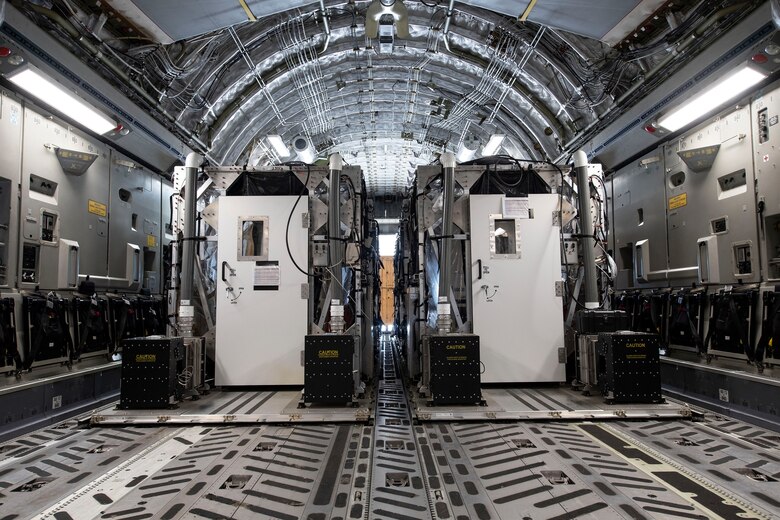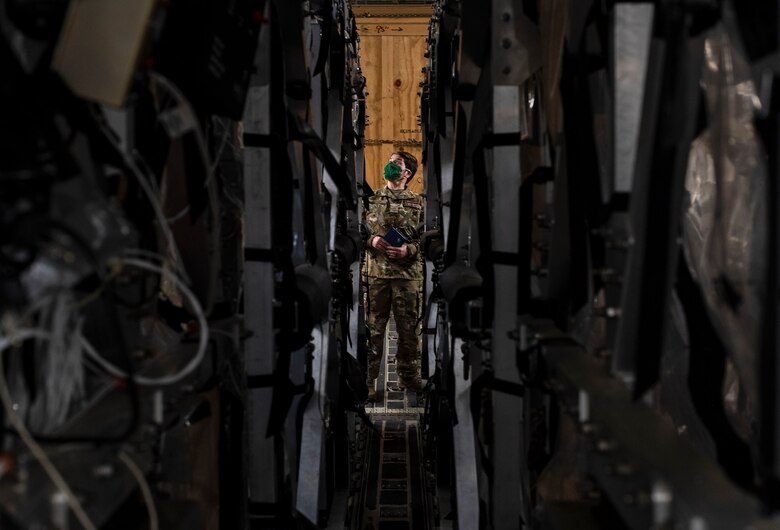Air Mobility Command, headquartered at Scott AFB, Illinois, selected Travis AFB, Joint Base Charleston, South Carolina, and Ramstein Air Base, Germany, as staging grounds for its AE missions involving Transportation Isolation System use.
The TIS is an infectious disease containment unit, each designed to transport two to four infected patients aboard an aircraft. The Department of Defense developed TIS units during the Ebola outbreak of 2014 to enable in-flight medical care for patients while mitigating the risk of exposure to aircrew, medical attendants and the aircraft. However, the system wasn't officially used by the DoD until the new coronavirus pandemic, when AMC transported three COVID-19 positive U.S. government contractors from Afghanistan to Ramstein AB on April 10, so they could receive care at a U.S. military hospital in Germany.
"With TIS being fairly new and relatively untested, a lot of importance is going to be in building foundational knowledge, especially in how squadrons and protocols work together," said Capt. Dan Cotton, a C-17 Globemaster III pilot with the 21st Airlift Squadron.
It takes an entire package of assets to support a TIS mission. A standard TIS Force Package consists of one C-17, two TIS modules loaded in the aircraft, a front end aircrew and a medical support team in the back, which includes an AE team, critical care transport team, infectious disease team (with a doctor and a technician) and TIS operators. These packages are often comprised of a combination of Airmen and aircraft from various units.
Currently, only the C-130H Hercules, C-130J Super Hercules and C-17 aircraft are able to carry the TIS capsules, making Travis AFB, with its fleet of 13 C-17s and location on the West Coast, a crucial player in the Air Force's efforts to repatriate service members and civilians who have been forced to remain in foreign countries as a result of the COVID-19 virus.
"Having the TIS here makes me think of all the people stuck overseas away from their families," Cotton said. "Being able to help them when they're needing it most is what we do. That's why we're here. It makes climbing into the C-17 and helping out with the AE mission feel really impactful."
As global COVID-19 cases surpass three million, the implementation of TIS, especially in respect to maintaining both the health of the Air Force's personnel and its current mobility capabilities, has proven to be successful in preventing the spread of the virus, said Capt. Freddy Roman-Otero, 43rd Aeromedical Evacuation Squadron Detachment 1 flight nurse.
"We're always ready," he said. "(TIS) has really expanded our capabilities to the point where we're able to continue the AE mission without any major interruptions by COVID-19. Despite the technology being made for Ebola, we've adapted it to suit today's needs."
From the 21st AS and 43rd AES here at Travis AFB to their Ramstein AB and Joint Base Charleston counterparts, cooperation is vital to mission success across the multitude of organizations supporting TIS operations.
"The 21st AS is happy to help in any way we can, and it just so happens that we're one of the only ones who can, so we can expect to be working a lot more with the 43rd AES in the future," Cotton said.

Transport Isolation System capsules are placed in the cargo bay of a C-17 Globemaster III April 28, 2020, at Travis Air Force Base, Calif. TIS capsules, which were initially engineered in response to the Ebola virus in 2014, allow the transport of individuals with highly contagious diseases without infecting other passengers or aircrew on the aircraft. (U.S. Air Force photo by Senior Airman Christian Conrad)

U.S. Air Force Chief Master Sgt. Jennifer Moses, 775th Expeditionary Aeromedical Evacuation Flight COVID-19 West Aeromedical Evacuation Task Force member, examines two Transport Isolation System capsules April 28, 2020, at Travis Air Force Base, Calif. The task force aims to research and implement best practices to help combat and prevent the spread of COVID-19. (U.S. Air Force photo by Senior Airman Christian Conrad)

U.S. Air Force Capt. Freddy Roman-Otero, 43rd Aeromedical Evacuation Squadron flight nurse, checks his equipment as part of a pre-flight procedure April 27, 2020, at Travis Air Force Base, Calif. Roman-Otero is one of two 43rd AES representatives called to perform training on the Transport Isolation System capsule. This training coincided with the 21st Airlift Squadron's transfer of four TIS capsules from Joint Base Charleston, S.C., to Travis AFB in an effort to bolster the U.S. Air Force's AE capabilities. (U.S. Air Force photo by Senior Airman Christian Conrad)






